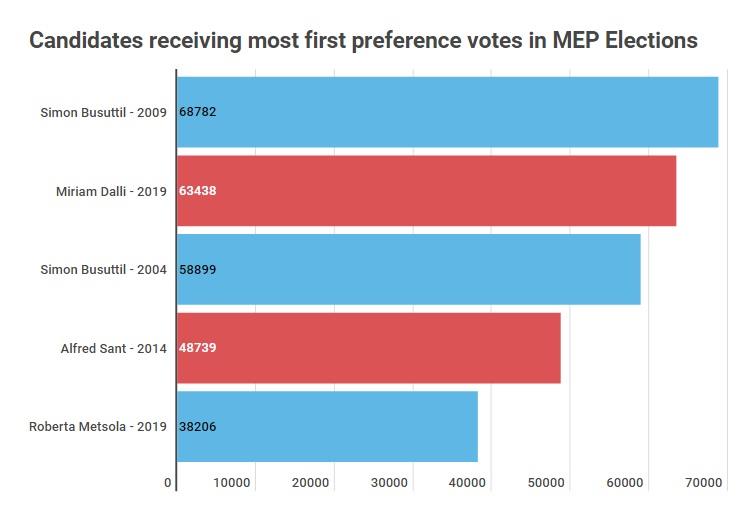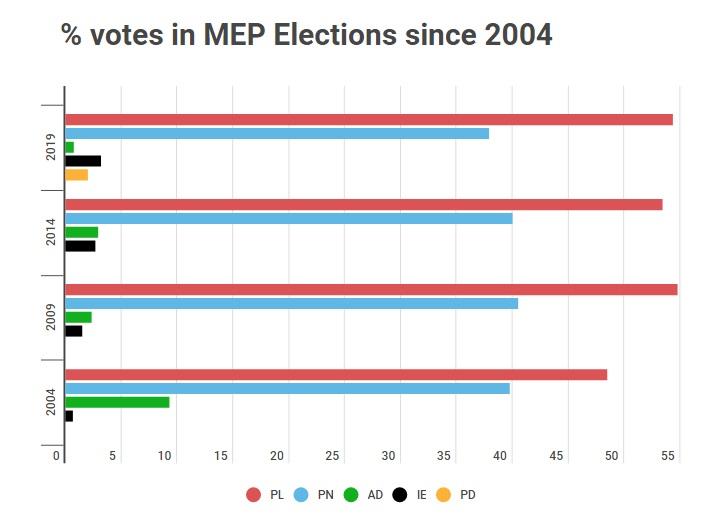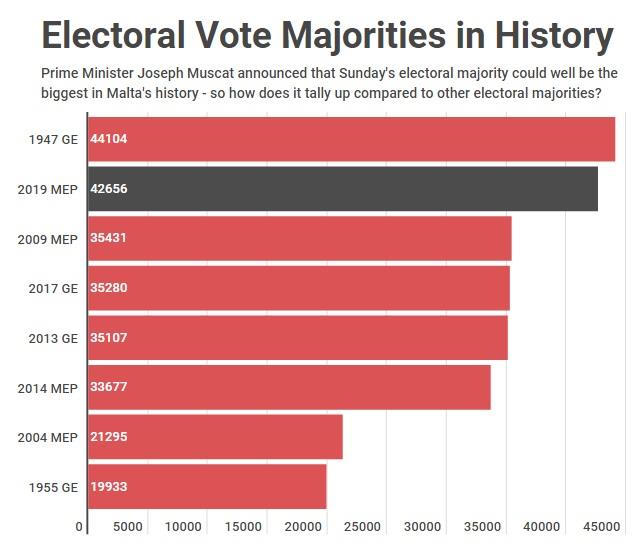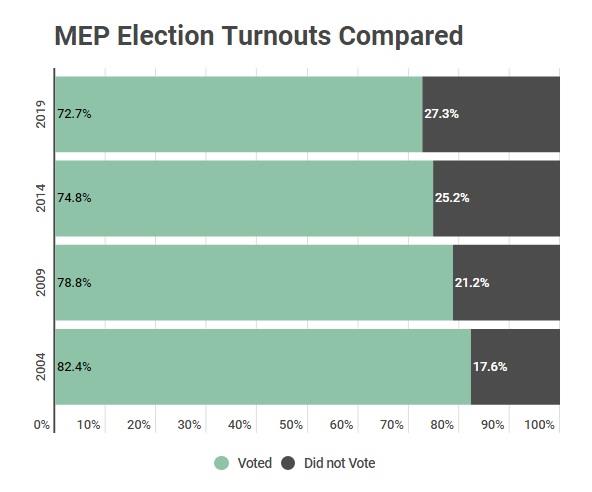As the dust starts to settle on last weekend’s European Parliament Election, a deeper look into the results shows that a number of records – both in terms of highs and in terms of lows – have been broken across the board.
Record Low – Electronic Counting system brings the results in record time
For the first time ever, an electronic counting (or, e-count) system was used in a Maltese election, and while the system experienced some teething problems on Sunday, it ultimately did its job and shortened the counting process to no end. With the manual counting system in 2014, it took until Wednesday – three whole days after counting started – for the final result to be obtained, but this year, thanks to the computerised system’s ability to work out the tedious and complex vote inheritance system, the full result was known in the early hours of Monday morning, days earlier than usual.
Record High – Malta’s voting franchise increases
This weekend saw the biggest number of people ever be eligible to vote in a MEP election in Malta’s history, with an electoral register which included a grand total of 371,456 voters. In the end, 270,222 people exercised their right to vote, a number which also surpasses the tallies for all previous MEP elections in the country, but...

Record Low – Thousands stay at home
Despite the aforementioned record; this weekend’s election actually boasts the lowest turnout on record for a European election in Malta. At 72.7%, this weekend’s turnout is 2.1% less than the 2014 MEP elections, and a whopping 9.7% less than the turnout for Malta’s first MEP elections in 2004. It means that just over 100,000 people either chose to stay at home and not vote, or not pick up their vote altogether. The decrease bucked the European trend as well; last weekend saw a projected 50.5% of EU citizens vote across the continent – the highest in the past 20 years. This all being said, Malta still holds the third highest turnout in the whole continent – behind Belgium (89%) and Luxembourg (84.1%).
Record High – Almost 10,000 votes rejected
A record high of 9,810 votes (3.6%) were deemed to be invalid and rejected by the Electoral Commission as the weekend’s counting process progressed. In past MEP elections, the number of invalid votes has always hovered around the 5,000 vote – or 2% - mark. This year, as already mentioned, saw the use of an electronic counting system for the first time and, when the system was rolled out, there were fears that the number of invalid votes could sky-rocket. This being said, the new system does not automatically reject votes – it is party and electoral commission agents who decide whether a vote is valid or not. Therefore, while it was observed that quite a high number of votes were sent by the system for adjudication, each of those was still scrutinised by multiple pairs of (human) eyes, making the high number of invalid votes compared to previous MEP elections a curious and noteworthy statistic.

Record High – Ballot sheet longer than ever
This weekend’s ballot sheet was the longest it has ever been, with a record number of candidates contesting for the six seats available at the European Parliament. Split across eight political parties and including five independent candidates, voters had 41 hopefuls to choose from. The field was at its smallest in 2004, when 27 candidates contested, while 34 candidates contested the 2009 MEP elections, and 32 candidates contested the 2014 MEP elections.
Record High – Labour delight
Labour’s gap may not be as record-breaking as it had initially seemed, but nonetheless the 42,656 vote gap between the PL and the PN is a post-independence record, surpassing the party’s wins in the MEP elections of 2009 and 2014 and its general election wins in 2013 and 2017. In fact, the tally is only surpassed by the 44,104 vote majority that Paul Boffa’s Labour Party won with back in 1947. In terms of the sheer number of votes; their tally of 141,267 first count votes is also a record high in MEP elections, although when the numbers are translated into percentages it shows that Labour’s 54.29% majority this year is less than the 54.77% majority it obtained in 2009’s MEP election.

Record High – Dalli breaks Labour record
Miriam Dalli was long touted as the front-runner in the polls, but the number of first count votes that she eventually did receive manages to surpass even the highest of expectations. With 63,438 votes to her name, Dalli obliterated the 37,174 quota and also broke the record for the most first count votes ever received by a Labour candidate in an MEP election. Alfred Sant’s tally of 48,739 votes in 2014 was the previous record. Her tally is not quite enough however to surpass the overall record for most first count votes received; PN former leader Simon Busuttil holds that record with his tally of 68,782 votes in 2009.
Record Low – Nationalist free-fall continues
Whilst the Labour Party has reason to celebrate once again, the Nationalist Party’s free-fall continued on Sunday. Prominent party figures such as Robert Arrigo and Clyde Puli can take comfort that the result could have been worse all they want, but it does not hide the fact that at 37.9% it is the PN’s worst showing ever in not only any MEP election, but also in any nation-wide election since Malta’s independence in 1964.

Record High – More voters drift to the far-right
Not only did Norman Lowell’s far-right, white ethnonationalist, eurofederalist party Imperium Europa, register a record high for support, it also became Malta’s third largest political party behind the two main stalwarts. As other countries such as France and Italy put their faith in right wing leaders such as Marine Le Pen in France and Matteo Salvini in Italy, 8,238 people – 3.17% of those who cast valid votes – gave their first preference to Lowell, meaning that his party surpassed the Democratic Party and Alternattiva Demokratika, even when putting those two parties together. It also means that the far-right firebrand was, in terms of first count votes, the 9th most popular candidate from the whole field. Lowell has contested all of Malta’s MEP elections so far, and his support has been steadily increasing. In 2004 he obtained 1,603 votes (0.65%), in 2009 he obtained 3,637 votes (1.47%), and in 2014 he obtained 6,761 votes (2.61%).
Record Low – Greens miss the boat
At the other end of the spectrum, Alternattiva Demokratika (AD) completely missed the boat in this weekend’s elections with party agents at the counting hall describing the Greens’ showing as a “disaster”. Party chairman Carmel Cacopardo and Mina Tolu only managed to gather 1,866 votes between – a meagre 0.72% of the whole vote, which is a record low. To add further insult to an already considerable amount of injury, their former leader Arnold Cassola – who broke away from the party before these elections – got more first count votes (2,127) than AD as a whole. It remains to be seen how AD will perform in the few local councils that they have candidates contesting in, but the party needs a long and hard reflective analysis before moving forward.